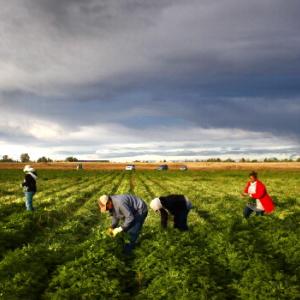Posts By This Author
Fields of Denial
About every five years the Farm Bill addresses a broad set of food and agricultural policy issues. Commodity price supports, farm credit, trade, agricultural conservation, research, rural development, energy, and foreign and domestic food programs were just some of the issues included in the Food, Conservation, and Energy Act of 2008, as the last Farm Bill legislation was officially titled.
The Farm Bill is also known for the broad range of policy stakeholders who work on it, including state organizations, national farm groups, commodity associations, conservation advocates, rural development organizations, and faith-based groups.
But even with its inclusive set of policy issues and actors, the Farm Bill is notable for one issue policymakers and advocates doesn’t touch: People who work on farms.
The Agricultural 99 Percent

Dockery Farm in MIssissippi by Natalie Maynor via Wylio http://www.wylio.com/credits/Flickr/139476025
It was a record year for U.S. farmers in 2011, with farm income topping $100 billion. This includes sales of $22 billion in fruits and nuts and $21 billion in vegetables and melons — crops that rely on immigrant farm labor.
But even as U.S. farmers prospered in 2011, those working on farms had less to celebrate.
The nation’s agricultural mecca — Fresno Country, California — had the state’s highest agricultural sales ($5.9 billion) and its highest poverty rate – 27 percent. More than 36 percent of the county’s children were poor, also the highest rate in the state. As one agricultural expert puts it, “High farm sales and high poverty rates often go together.”
Low wages, the seasonal nature of agricultural work, and, for many, unauthorized immigration status make it difficult for farm workers and their families to escape poverty. Farm workers’ high poverty rates aren’t totally attributable to immigration status, but it’s certainly one of the causes: 71 percent of all hired farm workers in the United States are immigrants, and about half of them are in the country illegally.
Migrant Workers and The Grapes of Wrath Revisited
When John Steinbeck's classic novel The Grapes of Wrath was published in 1939, it caused a sensation. It won the Pulitzer Prize and was the best-selling novel of the year. Just months later, in 1940, the book was turned into a film by John Ford, which was nominated for seven Academy Awards.
For readers today, Steinbeck's migration saga remains relevant as a piece of (dramatized) social analysis. It's essentially a road novel about the Joads, a poor Midwestern migrant farming family. Throughout the novel, the Joads fight to keep their family intact while fleeing the 1930s Oklahoma Dustbowl for the hope of farm work in California.
